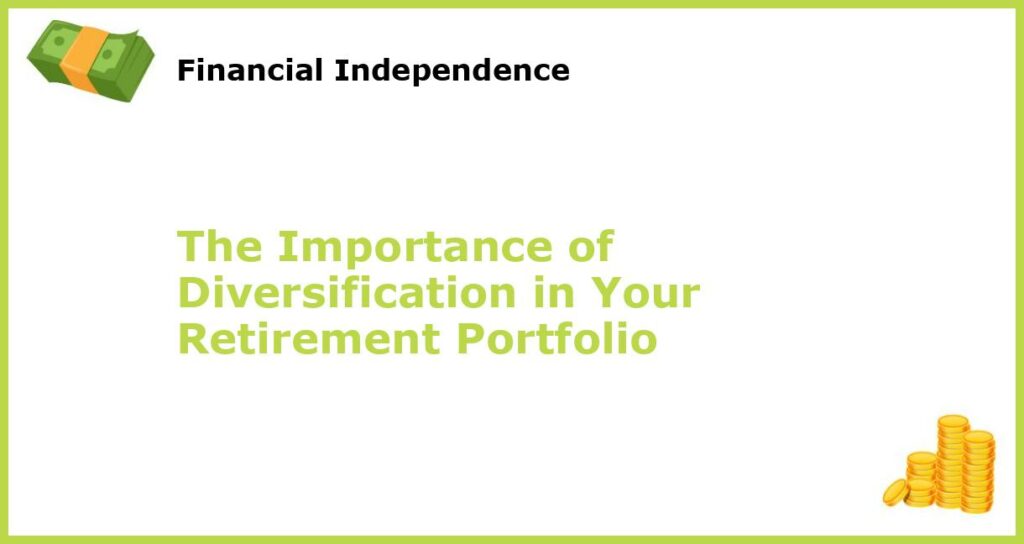Investing your retirement savings properly is crucial to live a comfortable life after retirement. The key to successful retirement investing is diversification. Diversification is a strategy of spreading your investments across different asset classes. This is done to reduce the risk of loss in case of market fluctuations. In simple terms, diversification means not putting all your eggs in one basket.
What is Diversification?

The practice of diversification refers to investing money in various asset classes such as stocks, bonds, real estate, and commodities to minimize investment risks. It is not advisable to invest all the retirement savings into one asset class. Diversification reduces the risk of loss in case of market fluctuations. When you diversify, you have different assets to fall back on if one asset underperforms. Diversification is a crucial investment tool and is a key aspect of any successful retirement portfolio.
Why Diversification is Important for Your Retirement Portfolio?

The significance of diversification for your retirement portfolio cannot be emphasized enough. Your retirement portfolio should not only provide peace of mind but should also allow the portfolio to perform its intended function of providing an income source. Diversification helps in balancing a portfolio thereby reducing the risk of loss. It also creates opportunities for returns in different markets. A well-diversified portfolio ensures that you can enjoy both the highs and lows of the various markets.
The Effect of Inflation on Your Retirement Savings

Inflation can reduce the purchasing power of your money over time. With this, you could be forced to either reduce your expenses or risk running out of money. Diversification can be helpful in mitigating the effects of inflation. Investing in different asset classes can help balance out inflationary effects on a portfolio. Asset classes tend to perform differently under different economic conditions. A diversified portfolio could provide returns that can help cover inflationary effects.
The Risks of Not Diversifying

The higher the investment risk, the higher the potential return. Investing in one asset class exposes an investor to the risk of underperformance from a market downturn. For instance, if you have invested everything in stocks and there is a stock market crash, then the crash would mean a significant loss of your retirement savings. Not diversifying also limits opportunities for growth that would come from other investments. Therefore, not diversifying is not an option for a successful retirement portfolio.
How to Diversify Your Retirement Portfolio
Several approaches can be used to diversify a retirement portfolio. One way of diversification is to invest in both stocks and bonds as they have a negative correlation. When stocks go down, bonds usually go up. This approach reduces the risk of loss associated with investing in one asset class. Another way is to invest in mutual funds and exchange-traded funds that hold a mix of assets. This way, the portfolio has exposure to the different markets and will yield gains across different markets. Diversification ensures that your portfolio can provide adequate returns to accommodate your retirement expenses.
The Benefits of Global Diversification
Global diversification is one way to achieve a well-diversified portfolio. Investing in international stocks can provide portfolio diversification and reduce risks associated with relying solely on the performance of domestic markets. Having a diversified portfolio that is not limited to domestic investments will allow for exposure to opportunities abroad that could lead to better returns in the long run.
The Role of Alternative Investments in Diversification
Alternative investments such as real estate, commodities, and private equity can provide diversification benefits. These assets have low or negative correlations with traditional asset classes, such as stocks and bonds. Investing in alternative investment opportunities can help balance out the effect of stock market volatility. Diversification through investing in alternative investments can bring about desired returns and stabilize a portfolio.
The Importance of Regular Portfolio Review and Rebalancing
Regular portfolio review and rebalancing are essential to maintaining the desired level of diversification in your portfolio. As portfolio suitability objectives change and asset classes perform differently over time, a portfolio may drift from its original allocation. Regular rebalancing ensures that you are investing according to your risk tolerance and investment objectives. Regular reviews ensure that the portfolio is performing according to the intended function of income replacement.
The Bottom Line
Gaining access to a steady income stream after retirement can be challenging, and it is essential to invest wisely. A diversified portfolio is a must-have for any successful retirement plan. Asset diversification reduces the risk of loss and ensures that your portfolio can yield adequate returns. It is essential to adopt a diversified investment approach that can weather market fluctuations over time, and provide adequate returns to cater for post-retirement life.







